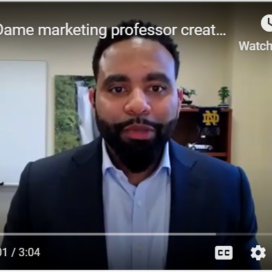Research with real-world impact
Published: January 23, 2022 / Author: Brandi Wampler

Notre Dame’s Yixing Chen has been recognized by The Financial Times for his research, “Improving Cancer Outreach Effectiveness Through Targeting and Economic Assessments: Insights from a Randomized Field Experiment.” Each year, the Financial Times conducts a special report for their Responsible Business Education Awards, which aim to “celebrate the institutions, researchers and alumni helping to change the way the world does business.”

Yixing Chen
Chen, an assistant professor of marketing at the Mendoza College of Business, and his co-authors at the Mays Business School of Texas A&M University, Ivy College of Business at Iowa State University, Jones Graduate School of Business at Rice University, and the University of Texas Southwestern Medical Center, were one of four recipients of the academic research awards for 2022.
These awards are intended to show that business school academics and their research can have a positive impact. Awarded research tackled significant societal problems with findings that drive change.
The paper published in the Journal of Marketing looked at how to use personalized marketing efforts to improve screening rates for liver cancer for high-risk patients and saving money for the health care system. Through combining a large-scale field experiment and machine learning, they analyzed how patients responded differently to different outreach marketing mediums: letters, reminder phone calls, and patient-centric follow-up conversations.
“A very small percentage of people are taking advantage of screening as a preventative measure,” Chen said in the article “A Targeted Approach” in the Spring 2021 edition of Mendoza Business magazine. But the researchers found personalization, a concept at the heart of marketing, made a significant difference.
For example, the researchers found that men with pre-existing conditions living in less populated neighborhoods with fewer primary care visits were less responsive to “light-touch” outreach or a screening invitation in the mail and additional follow-up by phone. However, that “light-touch” outreach strategy worked well with women who are covered by medical assistance, lived near the test site and received hepatology care.
“We show that by sorting out how responsive each patient is to each outreach type, we can boost the screening rates and save the health care system a lot of money.” Chen said.
Overall, the study helped identify what outreach methods worked best to reach varied audiences, which could lead to more liver cancer screenings and potentially lives saved.
Related Stories




